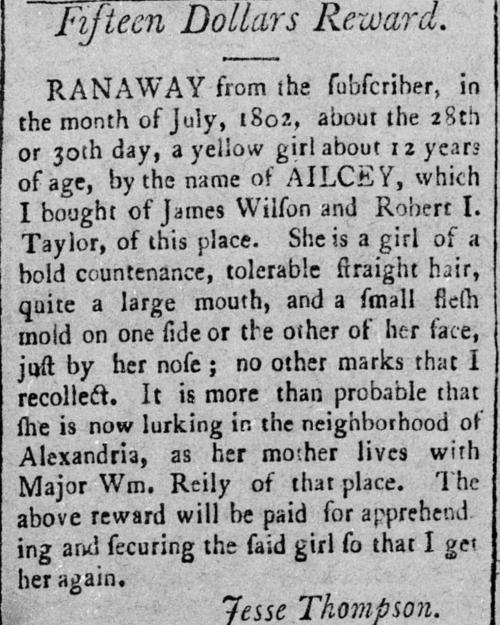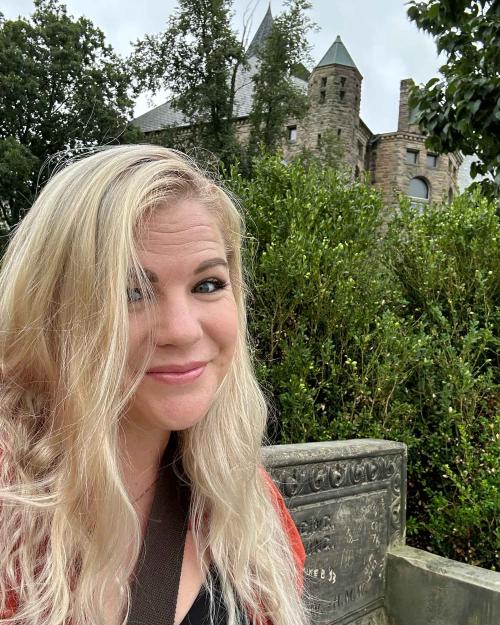Doctoral student Megan Jeffreys just couldn’t seem to get Ailcey’s runaway slave ad out of her head.
“A yellow girl about 12 years of age,” reads the 1803 ad from the Alexandria Advertiser and Commercial Intelligencer that Jeffreys discovered. “She is a girl of bold countenance, tolerable straight hair, quite a large mouth…”
“This was one of the first moments when it hit home for me, that even as a 12-year-old girl she could assert her own identity enough that her enslaver could have this perception of her,” said Jeffreys, whose thesis focuses on how the community of Alexandria, Va. in the 1800s was impacted by slavery and freedom-seekers. “Most of the stories of these people are incomplete, but they are still filled with bits of human resilience. We never know what happened to them, but their stories deserve to be told, whether they end happily or not.”
So began Jeffreys’ quest to study the issue of slavery from the point of view of those who tried to escape, using runaway slave ads as one of the foundations of her work.
The more than 7,000 ads that she’s catalogued from Alexandria, Va. will become part of Freedom on the Move (FOTM), a collective digital history project that is building a free and open archive of all existing “runaway slave” advertisements published in North American newspapers in the 18th and 19th centuries.
The FOTM project was one of the reasons Jeffreys chose Cornell for her doctoral work. Though the newspapers she used for her research weren't part of the project at first, now they will be. She’s spent two years as a research assistant on the project, which received a 2023 grant from the Mellon Foundation to add thousands more advertisements to its database. She is working with other graduate students and postdoctoral researchers through a partnership with Howard University and other institutions. The students have traveled to the American Antiquarian Society archives in Worcester, Mass. to scour physical copies of newspapers from across the country for the ads. These digitization efforts are supported by a generous gift from Mr. William O. Perkins, III.
Jeffreys started her dissertation research during the pandemic and spent two years living and working near Alexandria to conduct her research. The first year, most research centers were closed to the public because of the pandemic, but she was able to visit the city’s archeological museum and study genealogy records from the time period she was interested in. Her second year, she lived and worked with students in the Cornell in Washington Program, acting as both a resident advisor and a teaching assistant.
During that time, she came across the story of Rachel Graham, a woman who won her freedom by filing a “freedom suit” in the city, claiming that her grandmother’s enslavers has promised to free her and all of her descendants once they turned 31.
Through court papers, Jeffreys was able to discover that Graham’s younger brother and older sister had filed similar suits, but her brother died before reaching the age of 31. Her sister was successful and also won freedom for her children.
The case was complicated and intriguing – the enslavers of Rachel and her siblings were part of the Alexander family, the naming family of the city. Jeffreys also discovered that Francis Scott Key and other notable lawyers from the time often acted as lawyers for the enslaved people seeking their freedom. Scott Key was planning to represent Graham's younger brother before the brother's death.
Hard at work on her thesis, Jeffreys is in job interviews for various academic positions, including professorships and postdoctoral fellowships. She said part of her motivation from the beginning of her research was to bring the topic of slavery into open discussion.
“As an undergrad, I found that a lot of professors didn’t feel comfortable talking about slavery, which is a huge part of the history of the United States,” she said. “I’ve always been someone who doesn’t want to avoid these topics.”
She found that there were plenty of avenues of research related to slavery that had yet to be explored and, though the work can be traumatic, she feels it’s an important way to spend her life.
“We can’t change what happened, but not talking about it gives power to the wrong people,” she said. “We need to create safe spaces where people can broach these difficult subjects.”





